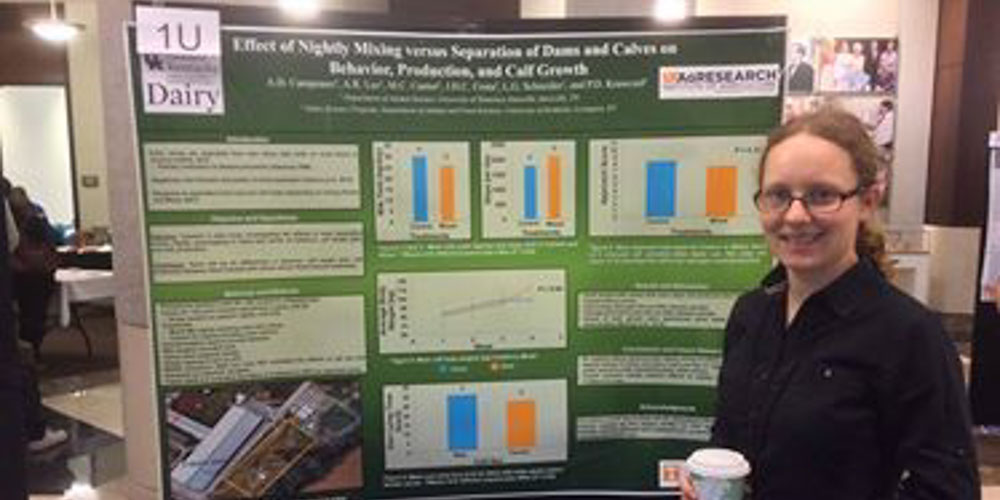Written by Ashley Campeaux
Agricultural research, though not something most people frequently think about, is incredibly important. It is responsible for the continuing safety and security of the world’s food supply, as well as ensuring that our agricultural practices foster optimal animal health and welfare. Because of these larger considerations and my interests in dairy science and veterinary medicine, I decided to conduct a pilot study that would open the door to future research toward maximizing dairy cow welfare while maintaining high standards for milk production. The study examined the effects of allowing newborn dairy calves overnight contact with their mothers (versus being separated at birth as is standard in the dairy industry) on behavior, calf growth, and cow milk production.
The project required the assistance of many people and without their collective help, it would not have been possible. I got to work and network with my faculty advisor and a professor from the University of Kentucky, both of whom are prominent authors of research in the field of dairy science. I also had the help of my graduate student mentor, Lee, who worked with me constantly and taught me everything I know about how to collect and analyze data. The staff and managers of UT’s dairy also worked closely with me and were there for support every step of the way. I look forward to working with UT Dairy and many of my other connections from this project in the future as I attend vet school at UT.

Ashley holding collected rumen fluid.
After our experimental procedures were approved by the Institutional Animal Care and Use Committee, which oversees all research involving live animals, my research team and I got started. The experiment was an intensive, 5-week-long undertaking, requiring hours of work at UT’s dairy just outside of Maryville, Tennessee nearly every day. I quickly had to learn to take and analyze blood samples, pass an esophageal tube to take samples of calves’ rumen fluid (fluid from the largest chamber of the stomach), identify signs of disease, and much more. As hard as the work was, I enjoyed every minute of it. I knew that what I was learning would carry over into vet school and my future career goal of being a large animal veterinarian. It also helped that several amazing undergraduate and graduate students volunteered their time. They were incredibly helpful and much appreciated because working with these animals was not a one-person job!
After the results were analyzed, I presented my project at the Women in STEM Symposium, and I will be presenting my project at the American Dairy Science Association conference in June of 2018. This will be a new and challenging experience for me, though I look forward to the opportunity to step out of my comfort zone and improve my communication skills while networking with others in the field.
My research has also helped me stand out during Veterinary School interviews because the interviewers were always excited to hear about it and I was passionate about telling them my results.
In researching, writing, and presenting my thesis, what I enjoyed most was being able to take everything I had learned in my animal science classes and from reading scientific literature and put it into context. In being able to apply what I had been learning about for years to the results of my own experiment, I felt that I understood the science behind everything we do in the dairy industry on a much deeper level. Despite this, I recognize now more than ever that I have only barely scratched the surface of what we understand about animal science and medicine, and this has only increased my desire to continue learning more.
The higher level of understanding and commitment to going above and beyond in the pursuit of knowledge for the improvement of science and technology is something I am passionate about and is the reason I wanted to pursue research. The Chancellor’s Honors Program has been instrumental in helping me achieve this, as the expenses were completely covered by a generous CHP Research Grant, without which my project would not have been possible. Furthermore, having contact with my peers in the honors community who are also involved in undergraduate research made the task feel less daunting because I knew that I was never alone.
Participating in research has been the most valuable and rewarding part of my education. It has allowed me to grow as a person and a professional, deepen my understanding of the science upon whihc I will build my career, and make a real contribution to what we know about the world.
